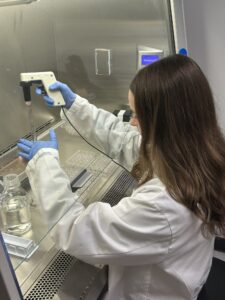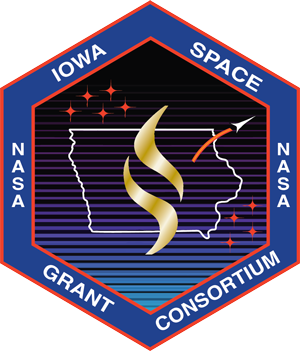 It has been determined that astronauts have elevated levels of cortisol from external stressors such as microgravity, which can result in the suppression of the immune system. As such, opportunistic infections, such as adenovirus (AdV) and cytomegalovirus (CMV), can take hold and cause serious disease. Filociclovir (FCV) is a novel compound that demonstrates activity against both CMV and AdV. The mechanism of action of FCV against CMV is virus-specific phosphorylation to a monophosphate followed by endogenous cellular phosphorylation to a triphosphate. The triphosphate inhibits the CMV polymerase resulting in inhibition of viral genome synthesis. Since both CMV and AdV encode a DNA polymerase (and these polymerases share a high homology), the mechanism of action of FCV against AdV was originally hypothesized to be the same as that against CMV. To test this, FCV was incubated with AdV-infected cells to determine the level of triphosphate during one virus replication cycle. Unlike CMV-infected cells incubated with FCV, no triphosphate levels were detected in AdV-infected cells. We, therefore, conclude that FCV has a different and distinct mechanism of action against AdV compared to the mechanism of action against CMV. As such, we will determine the mechanism of action of FCV against AdV by: 1) examining the chemical constituents necessary for FCV to elicit an anti-viral effect (structure-activity relationship), 2) examining the metabolism of FCV in both CMV- and AdV-infected cells, and 3) develop a FCV-resistant virus as a means to determine the exact molecular target of FCV in AdV.
It has been determined that astronauts have elevated levels of cortisol from external stressors such as microgravity, which can result in the suppression of the immune system. As such, opportunistic infections, such as adenovirus (AdV) and cytomegalovirus (CMV), can take hold and cause serious disease. Filociclovir (FCV) is a novel compound that demonstrates activity against both CMV and AdV. The mechanism of action of FCV against CMV is virus-specific phosphorylation to a monophosphate followed by endogenous cellular phosphorylation to a triphosphate. The triphosphate inhibits the CMV polymerase resulting in inhibition of viral genome synthesis. Since both CMV and AdV encode a DNA polymerase (and these polymerases share a high homology), the mechanism of action of FCV against AdV was originally hypothesized to be the same as that against CMV. To test this, FCV was incubated with AdV-infected cells to determine the level of triphosphate during one virus replication cycle. Unlike CMV-infected cells incubated with FCV, no triphosphate levels were detected in AdV-infected cells. We, therefore, conclude that FCV has a different and distinct mechanism of action against AdV compared to the mechanism of action against CMV. As such, we will determine the mechanism of action of FCV against AdV by: 1) examining the chemical constituents necessary for FCV to elicit an anti-viral effect (structure-activity relationship), 2) examining the metabolism of FCV in both CMV- and AdV-infected cells, and 3) develop a FCV-resistant virus as a means to determine the exact molecular target of FCV in AdV.
Courtney Smith – Drake University
Student: Courtney Smith, Undergraduate Student in Pharmacy, Drake University
Research Mentor: Dr. Brian Gentry

Determining the mechanism of action of filociclovir against adenovirus and cytomegalovirus
Undergraduate, 2024-2025
